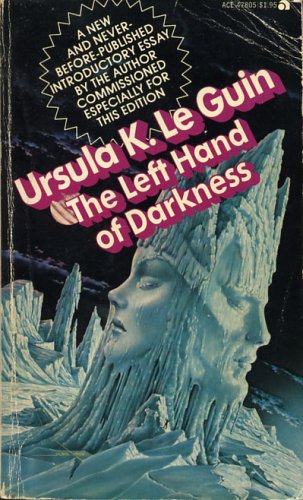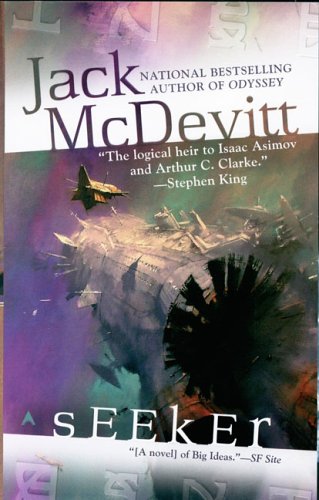Nebula update
1969: The Left Hand of Darkness
 I probably read this in 2006. This book falls into an interesting class of science fiction books -- they take place in a setting where interstellar travel exists, but it rare. Therefore, the book takes on an almost fantasy-world character, as it explores a different "Earth" -- in this case, one where inhabitants have no gender. The protagonist is an offworlder, sent to invite the planet's inhabitants into a galactic federation. Le Guin used this setting to explore gender in an interesting way. I can't say I loved this book, but I found it to be interesting and very well-written.
I probably read this in 2006. This book falls into an interesting class of science fiction books -- they take place in a setting where interstellar travel exists, but it rare. Therefore, the book takes on an almost fantasy-world character, as it explores a different "Earth" -- in this case, one where inhabitants have no gender. The protagonist is an offworlder, sent to invite the planet's inhabitants into a galactic federation. Le Guin used this setting to explore gender in an interesting way. I can't say I loved this book, but I found it to be interesting and very well-written.1983: Startide Rising

Another 2006 read. This one is the second set in Brin's "Uplift" universe, where humans have "uplifted" chimps, dolphins and other creatures to sentience. It's an interesting concept, but I found the parts that were told from the dolphin's point of view to be a bit tiring to read.
2005: Camouflage

Part of this story is about shape-shifting, immortal aliens who have been living among us. It's kind of interesting, but it really wasn't my cup of tea. It's not what I think of when I think "science fiction".
2006: Seeker

Seeker is the book I read while in France. It's the third book in McDevitt's "Alex Benedict" series. The first book appeared in 1989 and was about Benedict unraveling a story about the galaxy's military history. He was doing it when he came across a puzzle his recently deceased uncle, an amateur archaeologist, was exploring. The next two books in the series have appeared in the past few years and are told from the point of view of Chase Kolpath, Benedict's assistant, and deal with his business as an antiquities dealer. The books shift from what I'd consider "military future history" to "mystery", as well as changing narrator. McDevitt's work remains very good, and the fact that the mysteries are about events of galactic importance (it's not as cheesy as my phrasing makes it sound) allows the exploration of interesting "big ideas" like immortality and the nature of man.
The fourth book comes out next month, and I'm looking forward to reading that, as well as other, non-Benedict books by McDevitt.
2007: The Yiddish Policemen's Union
 This book gives me a weird sense of pride for a number of reasons. One, I read it before it was nominated for a Nebula, so I didn't need that to know it was going to be a good book. Two, a Pulitzer-prize-winning author like Chabon decided to dabble in science fiction. Three, my fellow science fiction aficionados recognized this as the year's best novel (it won both the Nebula and the Hugo) even though it was written by an "outsider".
This book gives me a weird sense of pride for a number of reasons. One, I read it before it was nominated for a Nebula, so I didn't need that to know it was going to be a good book. Two, a Pulitzer-prize-winning author like Chabon decided to dabble in science fiction. Three, my fellow science fiction aficionados recognized this as the year's best novel (it won both the Nebula and the Hugo) even though it was written by an "outsider".This book was really, really good. It takes place in an alternate history version of Alaska, where Jewish refugees were settled after World War II, instead of in Israel. But they were only allowed to stay for 50 years, and now they have to leave. Oh, yeah, and it's a murder mystery. And incredibly weird combination of ingredients, but Chabon not only makes it work, but elevates it to literature, not just "pulp fiction". Not only did this deserve the Nebula, it makes it clear that some of the other works on the list don't belong in the same category.
So I go from having read 24 out of 41 to 29 out of 44. I actually picked up some of the other ones in this time period, but I didn't make it all the way through them. That's not a good sign, but I'll try again at some point. I am also going to take a look at the runners up for more ideas about good books to read.
To make it easier on myself to keep track, here is the complete list of Nebula novels I've read as of October 2008:
- 1965: Dune, Frank Herbert
- 1969: The Left Hand of Darkness, Ursula K. Le Guin
- 1970: Ringworld, Larry Niven
- 1973: Rendevous with Rama, Arthur C. Clarke
- 1974: The Dispossessed, Ursula K. Le Guin
- 1975: The Forever War, Joe Haldeman
- 1977: Gateway, Frederik Pohl
- 1980: Timescape, Gregory Benford
- 1983: Startide Rising, David Brin
- 1984: Neuromancer, William Gibson
- 1985: Ender's Game, Orson Scott Card
- 1986: Speaker for the Dead, Orson Scott Card
- 1988: Falling Free, Lois McMaster Bujold
- 1992: Doomsday Book, Connie Willis
- 1993: Red Mars, Kim Stanley Robinson
- 1994: Moving Mars, Greg Bear
- 1995: The Terminal Experiment, Michael J. Sawyer
- 1996: Slow River, Nicola Griffith
- 1997: The Moon and the Sun, Vonda N. McIntyre
- 1998: Forever Peace, Joe Haldeman
- 1999: Parable of the Talents, Octavia Butler
- 2000: Darwin's Radio, Greg Bear
- 2001: The Quantum Rose, Catherine Asaro
- 2002: American Gods, Neil Gaiman
- 2003: The Speed of Dark, Elizabeth Moon
- 2004: Paladin of Souls, Lois McMaster Bujold
- 2005: Camouflage, Joe Haldeman
- 2006: Seeker, Jack McDevitt
- 2007: The Yiddish Policeman's Union, Michael Chabon
[Note: Since my last Nebula update, Blogger has introduced the "labels" feature; this has allowed me to gather all of the updates here.]
Labels: nebula












